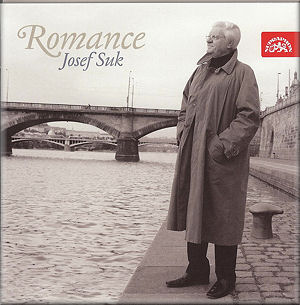 |
 |
|


alternatively
CD:
AmazonUK
AmazonUS
|
Romance
Antonín DVOŘÁK (1841
- 1904)
Romance in F Minor Op. 11 (1877) [12:58]
Ludwig van BEETHOVEN (1770-1827)
Romance No. 1 in G, Op. 40 (1802) [7:33]
Romance No. 2 in F, Op. 50 (1798) [9:06]
Johan SVENDSEN (1840-1911)
Romance in G major Op.26 (1881) [7:30]
Zdeněk FIBICH (1850-1900)
Romance in B flat major for violin and orchestra Op.10 (1879) [5:42]
Peter Ilyich TCHAIKOVSKY (1840-1893)
Sérénade mélancolique for violin and orchestra (1875)
Henryk WIENIAWSKI (1835-1880)
Violin Concerto No.2 in D minor Op.22 - slow movement (Romance) (1870) [4:59]
Hector BERLIOZ (1803-1869)
Rêverie
et Caprice for violin and orchestra Op.8 (18410
[8:47]
 Josef Suk (violin) Josef Suk (violin)
Czech Philharmonic Orchestra/Václav Neumann (Dvořák)
Prague Symphony Orchestra/Václav Smetáček
rec. January 1978, Rudolfinum, Prague (Dvořák), January 1970, Studio
of Czech Radio, Prague (Beethoven No.1); November 1977, Smetana Hall of the Municipal
House, Prague (Svendsen, Fibich, Tchaikovsky, Beethoven No.2, Wieniawski, Berlioz)
 SUPRAPHON SU4000-2 [66:29] SUPRAPHON SU4000-2 [66:29]  |
|
|
Josef Suk was 80 in 2009 and this disc - one of gentle, unabrasive
and charming felicity - is a small tribute to him from his record
company of so many years.
The bulk of the pieces were taped in 1977 with the Prague Symphony Orchestra
and Václav Smetáček. Of the others the Dvořák
Romance is not to be confused with Suk’s famed meeting with Ančerl
- this one is a later recording in 1978 with Neumann. One of the pieces, the
First Beethoven Romance, derives from a 1970 session.
This compilation has been selected then for its dappled restraint. It moves as
slowly as a river boat down a becalmed Vltava. For fireworks you will have to
go elsewhere; for autumnal pleasures you can certainly join in, though consecutive
listening, even when played by a master such as Suk, is probably best avoided
in case ennui sets in.
The Dvořák Romance was taped when he was 49 and is played with his
usual ineffable sweetness and lyrical reserve - there’s just the right
weight of bow pressure, and just the right sense of line. Nothing is over-inflated
or over-vibrated. The wind choir too generates its own special momentum and in
front Suk plays with pliant rubato and lovely tone. He plays the G major Beethoven
with gentility and humanity and its companion, which he takes in a very stately
way, is also refined. Fiddlers of yore had Svendsen’s Romance in their
knapsacks and fortunately it seems to be coming back into fashion. It has the
verdant Grieg-like freshness - they were contemporaries, Grieg slightly the younger
in fact - that always proves efficacious. Suk honours its dance patterns adeptly,
as he does the gentle pathos implicit, though as always with Suk he deigns to
plumb ostentatious depths.
He is on home turf with Fibich’s little Romance, probably the least well
known of the eight pieces here. Note how affectionately Suk plays the speech
inflected melodic lines, and how he hints at the folkloric element embedded within,
all the while ensuring ballast and buoyancy to the solo line. His Tchaikovsky
is again somewhat under-stated. His refinement is of the ‘less is more’ school
and it serves as a reminder of his eloquence of utterance. The Wieniawski has
been extracted from the D minor Concerto and is replete with patrician gestures,
and the Berlioz Rêverie et Caprice makes for a fine envoi
- the rapport with Smetáček is solid to the last.
For admirers of Suk, this measured and affectionate tribute reissue is pleasing,
the booklet attractive, and the spirit that animates the production laudable.
Jonathan Woolf
|
|




 All Nimbus reviews
All Nimbus reviews








